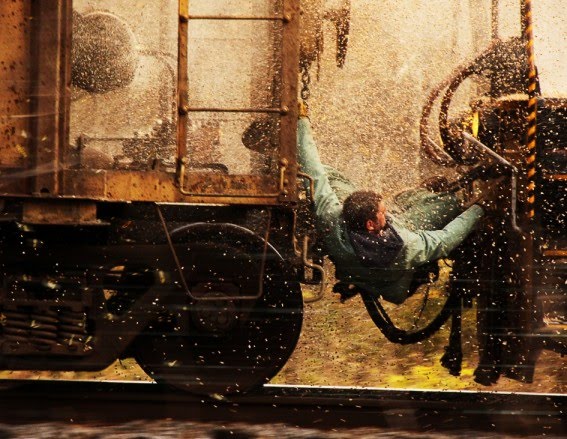Unstoppable: A-
So many critics hate on Tony Scott. They criticize his ADHD film-making style as assaultive, frenzied, incoherent; they routinely pick on and belittle this aesthetic the way certain students might gang up on the kid who's a little bit "off". They hone in on what they believe to be deficiencies instead of strengths, and they attack those characteristics mercilessly. Basically, Tony Scott doesn't get much love.
That's a shame because to paraphrase Dennis Green, Tony Scott is exactly who we think he is. And I love him for it. I look forward to his oversaturation of film stock, his whip-pans, the fact the man never seems to want to use a stationary shot when the camera can just spin around or careen towards its subjects like the train at the heart of his newest film, Unstoppable. One thing about Tony Scott: his shit ain't boring.
Unstoppable is a terrific movie because it gleefully traffics in cliches (the grizzled veteran versus the privileged upstart; the amoral head honcho willing to sacrifice human lives rather than dollars; school children in grave danger). However, it also subverts them by lending an aura of authenticity to the proceedings and it convincingly develops a deep empathy for the men and women involved in attempting to stop Train #777. Based on a true story that occurred in Ohio ("The Crazy 8's"), the setting is now Pennsylvania and it concerns a runaway train with no one at the controls. Several of the cargo cars are carrying Molten Phenol, a deadly chemical, and a host of other obstacles are placed in the path of a train studio suits vomited the hyperbolic title "unstoppable," although anyone with a few brain cells or knowledge of big-budget Denzel Washington pictures should know that if Denzel is in the mutha-fuckin house, he'll be the one person to stop it. Molten Phenol be damned!
I'm not meaning to slam Denzel. Like Tony Scott and Dennis Green, he is who we think he is. He's never going to blend into an everyman role. No movie star can do such a thing, no matter how talented, because the celebrity and the persona created by 24/7 infotainment has eviscerated the line between performance and person. Remember - celebrities, they're just like us. Shit, that reminds me I need to re-up my subscription to US Weekly.
And Denzel (as Frank Barnes) and Chris Pine (as Will Colson) do solid, natural work here; their characters are the two men who take it upon themselves to catch up to the runaway train and stop it. Neither role is showy; the trains are the stars here, as they should be, and Scott wisely allows viewers the time to understand: a.) the complexity involved in the logistics of the railway system and b.) how Triple 7 was allowed to find itself hurtling at breakneck speeds. Human innovation, intelligence, and ingenuity account for the first part functioning successfully, while human stupidity allows for the second.
This is a perfect film where content, context, and style merge to thrilling effect. Scott's bag of visual flourishes keep the movie moving, but he restrains himself from CGI overload (with the exception of one egregious instance). Scott does an admirable job of establishing the railway system, a system that rarely seems to earn any respect these days with the invention of some new technological wonder being trumpeted everyday (remember when the Segway was supposed to revolutionize travel?).
But the railway system helped announce the birth of narrative cinema aat the turn of the 20th century with The Great Train Robbery in 1903. And despite the fact it might appear to be the older, uglier brother to its' airplane brethren, its' ruggedness has lasted centuries. More importantly, its' historical mark cannot be underestimated. Before planes or cars, the railway was the form of transportation both for people and economic goods. Not to mention, the social economic issues that have accompanied railroads through the years from the Pullman porters (ex-slaves who were hired for work after the Civil War and allowed to unionize) to the various violent strikes over labor issues to regulation all the way up through today, where political battles rage over undocumented workers, many who come to this country aboard El Tren de la Muerte ("The Train of Death" - read Sonia Nazario's Enrique's Journey or watch the film Sin Nombre). So despite the story told being inherently cinematic, the fringe details of the work portrayed allow the viewer a greater appreciation of the system and the men and women who work to operate it. I'm not claiming it digs deep into the lives of these working-class employees (it doesn't have the time nor the vision nor the intent to be Season 2 of The Wire), but it doesn't neglect the lives lived around the tracks. When Barnes, an engineer, tells Colson he won't be able to fit their train into the siding off the main track and explains the math behind his reasoning, you see a man who's learned by doing. Little scenes like this provide the film its emotional heft and Scott doesn't need nor use fancy visual acrobatics to sell it to the audience. Unstoppable isn't merely superior entertainment; it's a love letter to the railway and the blue-collar workers who make the industry thrive.




Nice review B. How was Chris Pine as a follow-up to his star trek character?
ReplyDeleteI think he's the real deal. Not a flashy role, and he doesn't play it as such. I think this guy could have a real nice career oscillating between this type of big budget stuff and smaller, more intimate films.
ReplyDelete